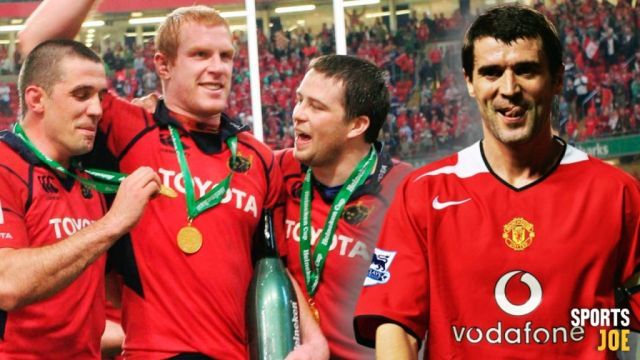“We talked about leadership.”
As a player driven to be the best, and make the most out of what talents he had, Roy Keane always identified with the All Blacks.
Football was always Keane’s first love but, like many sports fans in Ireland, he followed the fortunes of Munster and the Irish rugby team when the big matches came around.
In 2005, when Munster were preparing to play Sale Sharks in a vital Heineken Cup game, their coach Declan Kidney got Keane in for a chat with the squad. The Cork native was still Manchester United captain at the time.
Munster hooker Jerry Flannery told House of Rugby: “I remember he walked in and he was kinda looking around at us and there were pizzas everywhere. And he was tiny. Do you remember how small he was, man? He was so small and we were these fat rugby players. I thought he must be looking at us like we’re idiots.
“Do you remember him saying, ‘Oh I stopped eating meat’ and all that? Keane said that the dietician or the nutritionist in United came in and said his body fat was a bit too high. And he went completely the opposite and became obsessed with his diet.”

When he finished up playing, Keane took over as Sunderland manager and led them to the Premier League. Ahead of the 2008/09 season, he travelled to New Zealand to spend a week learning from Graham Henry and his All Blacks coaching staff.
“Seeing them in action in New Zealand fulfils a lifetime ambition,” he said, at the time.
In an interview with David Walsh in The Sunday Times, Keane recalled seeing an All Blacks player dropping a couple of passes. It struck him that no-one had admonished the player for the repeated errors. The ABs coach replied:
“Do you think we are here to coach him how to catch a fucking ball?’ He said he’ll fall by the wayside, don’t worry about him.”
“I loved it,” Keane said. “Brutal.”
Roy Keane and Graham Henry chat during an All Blacks training session at Rugby League Park in Wellington, New Zealand. (Photo by Ross Land/Getty Images)Roy Keane kept up that interest in rugby and got along to a couple of big Ireland games in recent years.
In 2019, he was invited to speak with the England rugby team at their Pennyhill Park Hotel training base, in Surrey, not long before they set off for the World Cup. He had a Q&A session with the squad and recalled being approached by the England captain after that wrapped.
“Owen Farrell asked if he could have a private one-to-one chat. He was a really interesting fellow, a little vulnerable because he was captain of England but not of his club,” said Keane.
“We talked about leadership. General chat, I like innocent people, ones who aren’t cool, who don’t worry about going against the tide. I gave him the advice I would give anybody who is trying to lead – Be a decent human being, be on top of your own game and don’t be an arsehole.”
Three tips from one of the best footballers of his generation, and a man that rinsed every bit of talent and determination he had to make it to the top.
Farrell and Keane have a lot in common. They are both divisive players and can rile up opposition fans, but they lead by example and command the respect of those around them.
“When he plays for England, everyone loves him,” Saracens teammate Alex Goode once said, “but, the rest of the time, people want him to fail.
“And they’re like, ‘Oh, he’s a dirty player’ and ‘He’s not the sort of player we want to have as captain’. And you’re thinking, ‘What’s it to be?!'”
Perhaps the definitive answer on whether Owen Farrell is a natural leader came from British & Irish Lions head coach Warren Gatland, earlier this year.
The Kiwi revealed that when votes were tallied for the squad’s leadership group, Farrell got the most.
“It speaks volumes for the respect in which he’s held by the other players in the group – not just the England players, but the others too,” said Gatland.
Related links:
- Roy Keane tells the most Roy Keane story every about attending Neil Diamond concert
- Rio Ferdinand and Jamie Carragher trade insults after Roy Keane argument
- Gary Neville hilariously reacts to Jamie Carragher and Roy Keane argument




































